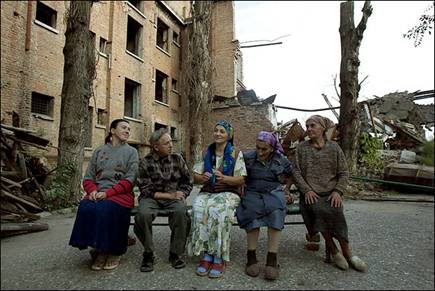|
|
In a Ruined City
By Seth Mydans
New York Times, June 1, 2004

GROZNY, Russia - There is one green poplar in the row of dead and brittle trees that line a shattered building here, and by coincidence it stands at the only doorway that is not in ruins.
Both have been preserved by some mystery of nature through 10 years of war that have left behind a neighborhood of bombed and uninhabitable piles of brick.
On a bench near the doorway sit some of the women who live here, cracked and chipped by the rough handling of life, warming themselves in the pale sunlight of another spring.
Their main achievement, and still their main pursuit, is that they have stayed alive here in Chechnya through war and cold and hunger and illness, pulling one another along if any lagged behind.
"Nobody else cares about us," said Alla Kharlamova, 60, hovering between tears and anger. "We simply exist."
Her neighbor Viktoria Kuradjan, 76, a tiny woman bent by age like a crooked finger, contributed a sigh, "Hoo, hoo, hoo."
Now the nine women and the two mild and quiet men who live inside with them face a new threat that could cost them their livelihood and even their home.
Thieves have been carting away their bricks.
Having lost everything else, this little group of mismatched neighbors is living off the rubble that has collapsed around them, cleaning and selling the bricks, one by one.
A new breed of entrepreneur, the brick dealer, has emerged in Grozny, buying up good quality bricks like theirs for a ruble apiece, or about three cents.
At that rate, nine bricks will buy a loaf of bread. Eighteen bricks will buy a dozen eggs. Twenty-five bricks will buy a carton of pasteurized milk. Ten bricks will pay for the bus ride to and from the market.
"Ten rubles," Ms. Kuradjan said. "That's very big money. For me, even one is a lot."
Rubble is now the main natural resource of this battered city, including the remains of the oil refinery and factories that flourished here before the war. An iron beam can pay to fix a leaking roof. Children search the ground as they walk, looking for bits of metal.
Once, a brick dealer with a truck bought 1,600 bricks from the women who live here - a moment they still describe with wonder.
More often, though, robbers carry off their bricks at night.
"We say, 'Don't take them! This is our building,' "Ms. Kharlamova said. "But they take them anyway."
A small, trembling woman in rubber boots and a head scarf, she sometimes stands sentry over the bricks as if that could make a difference.
"They threaten me," she said. "They told me, 'Look out, or you'll find your head in a tree.'"
"One day a woman came with a folder of papers and very officially said, 'Get out. We are knocking down your home,' "Ms. Abdurahmanova said. "We said, 'Where are we supposed to go?' She said, 'I have no idea.' "
At this point, half of the building's 36 apartments have been demolished and more may follow.
If they are forced to move, the little family here will leave behind the grave of a man named Viktor Marsak, one neighbor who did not survive the war.
"He died of cold and hunger, even though I gave him the same as I gave myself," Ms. Abdurahmanova said, wiping her eyes. "He always said, 'I'm helpless, Larisa, help me.' I wanted to bury him with his mother but it was too dangerous to go around and look for her grave in the cemeteries."
Once, when the fighting was heavy, they took in a neighbor who was almost blind.
"We cut wood for a fire and melted snow for water," Ms. Abdurahmanova said. "The wind was blowing through the window. Then there was shooting. We didn't know what to do. We hugged each other. I fainted."
Soldiers came and aimed their guns at the blind man. "Stop!" the women shouted. "He's blind!"
As the soldiers took him away to a hospital, Ms. Abdurahmanova said, he called back to her, "Larechka, my little daughter, when I can see again I'll look for you."
Last winter, the struggle to keep living became too much for Ms. Kharlamova and she decided to die. Her neighbors banged on her door and shouted.
"Alla, open up!"
"No, I won't open."
In the end, she accepted a glass of honey and milk.
"I have allergies," she explained. "It's hard to breathe."
Now a new stray has come to join the clan, Yaha Gaziyeva, who was abandoned by her husband three years ago along with her daughter, Diana, who is now 8.
Since then, mother and daughter had been supporting themselves by foraging for bricks and scrap on the territory of the ruined oil refinery.
Diana, a beautiful girl with steady, wide-set eyes, is sick. Her blond hair is turning gray and there are strange blotches on her skin that darken in sunlight. Sometimes she says she feels that she is choking.
When she comes home from school, she lies down as Ms. Abdurahmanova gives her an intravenous drip.Doctors say they think Diana was poisoned by toxic pollutants as she collected bricks with her mother.
|

|
|



